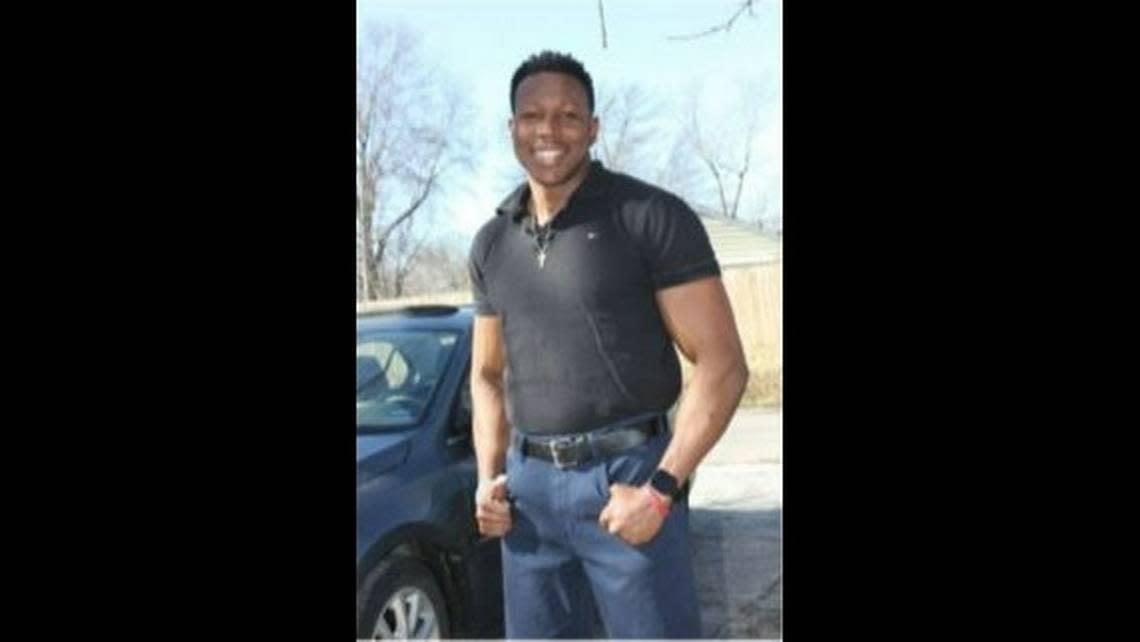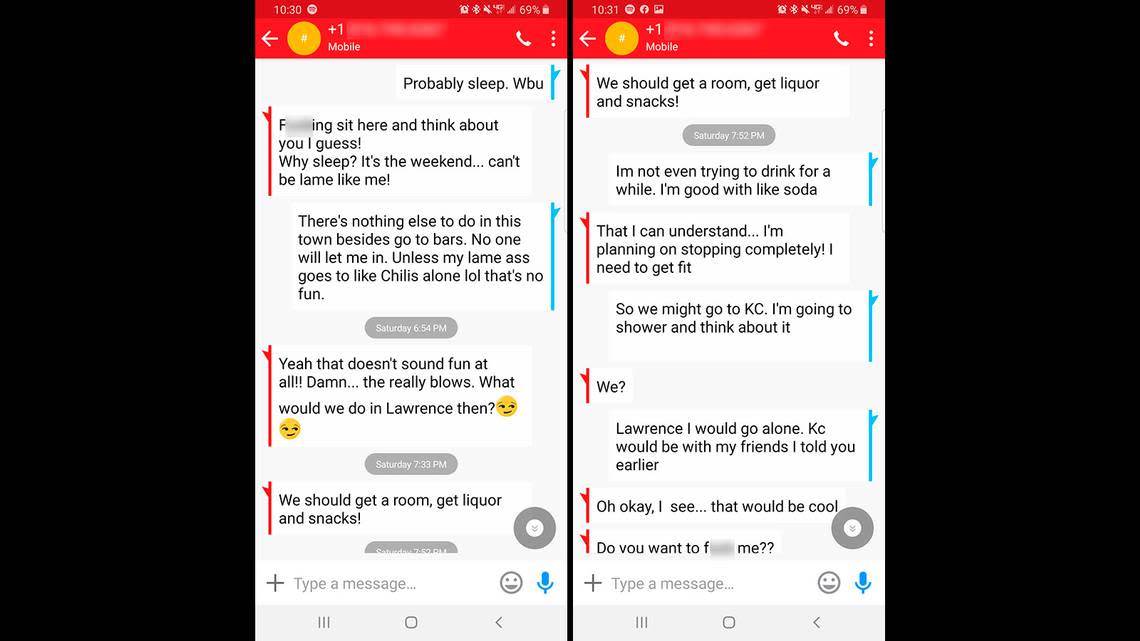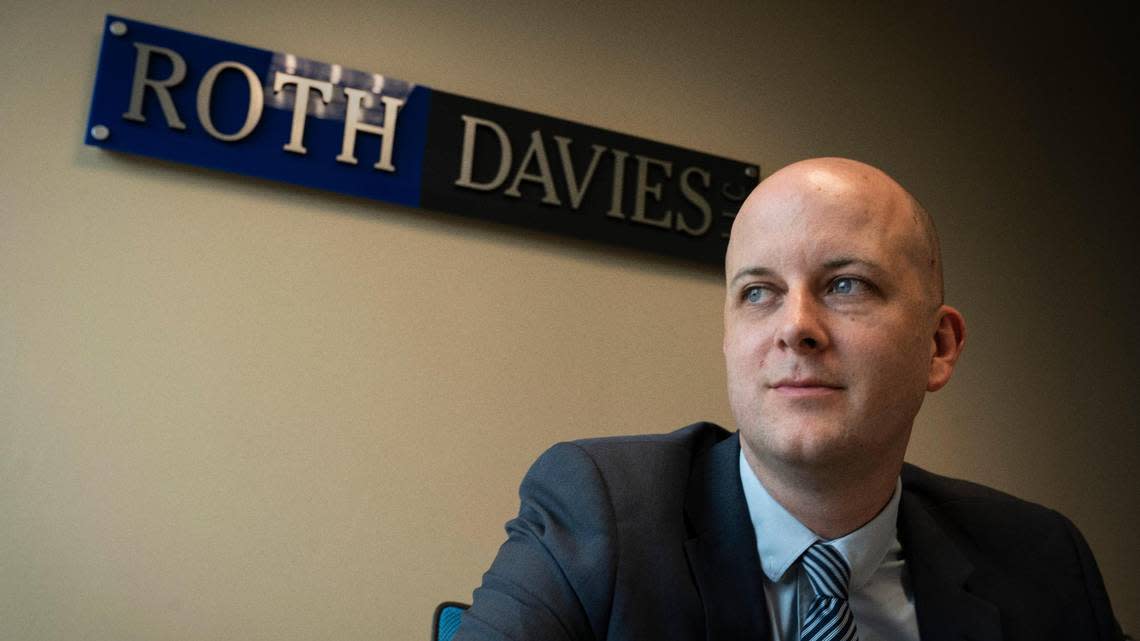KC area cop asked a woman for sex after arrest. He stayed on the job for over a year
A Prairie Village police officer was allowed to stay on the job for 19 months after department officials were alerted that he had asked a woman for sex after arresting her.
The officer’s actions, along with correspondence showing how his supervisors were told of the incident, came to light after his Kansas police license was revoked in June in part because of an unrelated domestic violence investigation.
Attorney Brandan Davies said he reported to Prairie Village police in March 2020 that officer Rolando Swaby had arrested his client in a DUI case and later sent text messages asking her to meet him at a hotel for drinks and sex ahead of a court hearing in her case. The Star generally does not name possible victims of sexual harassment or abuse without their consent.
After communicating with a police sergeant, Davies said, he thought the officer would be fired.
Instead, Swaby was allowed to remain on the force for more than a year and a half until he was investigated in an unrelated domestic violence case in October 2021. He later resigned and lost his Kansas police license.
Davies said the police department had the information to take action against Swaby much earlier.
“They knew back in March 2020 that this guy, this Swaby, was not the type of person to be trusted with pulling people over and enforcing the law,” Davies said. “And they didn’t do a damn thing.”
Capt. Ivan Washington, a spokesman for the Prairie Village Police Department, said officials opened an internal investigation into the March 2020 incident and handled the inappropriate conduct “shortly thereafter” as a personnel matter. The department decided the interactions were with an adult, were outside the arrestee’s time in custody and “voluntary and reciprocal,” he said.
“It’s not the standard here,” Washington said. “It’s not the expectation. It’s not the norm.”
The police department declined to specify how Swaby was disciplined.

When reached via email with questions about how the police department handled the matter, Prairie Village Mayor Eric Mikkelson and City Administrator Wes Jordan said Swaby received “punitive disciplinary action.”
They said the investigation found Swaby’s actions were “unprofessional and not in compliance with the high standards, rules and regulations of the Department” but also cited the department’s findings that the text exchanges were “reciprocal.”
“It was important to me to see that our Police Department took swift disciplinary action against this officer for the misconduct,” Mikkelson, who declined a phone interview with The Star, wrote in an email. He declined to answer further questions.
An interaction between an arrestee and an officer can never be reciprocal because of the power imbalance between them, said Lauren Bonds, legal director for the nonprofit National Police Accountability Project.
The arrestee has to worry about possible future court appearances, criminal charges or other consequences with the law.
“There’s an underlying element of coercion that should have informed their assessment of the situation,” Bonds said.
“If this was something that the woman felt comfortable revealing to her advocate that it was a problem, that should have been potentially a flag that this was not something that she was comfortable doing.”
Civilian complaints, and especially under-reported issues like sexual misconduct, are often excused by police departments with little consequences for the officer, Bonds said.
‘We should get a room’
Swaby arrested the woman on suspicion of driving under the influence on March 1, 2020, according to a report from the Kansas Commission on Police Officers’ Standards and Trainings (CPOST).
The woman, identified in CPOST reports as A.D., reached out to Davies for legal representation and mentioned that the officer had made sexual advances toward her. She expressed worry to Davies that stopping her interactions with the officer would negatively affect her DUI case.
Screenshots of the texts and Snapchats obtained by The Star show Swaby and the woman discussing their weekend plans before he asks her for sex.
He writes that he’ll “sit here and think about you I guess,” before making a suggestion to A.D: “We should get a room, get liquor and snacks!”

A.D. tells Swaby that she is trying to avoid alcohol and tells him she might go out with her friends in Kansas City. Swaby responds with an explicit message, asking A.D. if she would want to have sex with him.
In screenshots of Snapchat messages, Swaby tells A.D. to find something to do near him over the weekend.
“Random - I think you’re hot,” he wrote, according to a Snapchat screenshot. A.D.’s replies aren’t visible in the screenshots.
“Yup, thoughts I probably shouldn’t be having but I’m human,” he wrote. “I didn’t want to overwhelm you … you’ll get tired of me hitting you up . . .”
At another point, they exchange messages about her potential license suspension, and Swaby asks A.D. if she hates him.
“(I guess) it’s easy to blame me in certain circumstances,” he writes. “But you still talk to me … so I just wanted to know.”
Reporting to police
Davies was shocked when A.D. showed him the messages, he said.
He reported the officer’s conduct to Eric McCullough, who at the time was a sergeant at the police department, a few weeks later in mid-March.
Screenshots of the emails show Davies first sent McCullough some of the photos of the messages on March 12, 2020. He also confirmed a call with McCullough to discuss the incident a few days after and later thanked him for speaking with the arrestee.
Davies sent McCullough the remainder of the screenshots of the texts and Snapchats by March 18, email screenshots show.
Davies said he doesn’t recall hearing from McCullough after that point. Their correspondence led him to believe Swaby would lose his position as an officer before his client appeared in court.
“I’m thinking, 100% sure, that of course Prairie Village is going to fire this guy,” Davies said. “It just can’t get more of a conflict of interest to try to hook up with someone that you’re prosecuting for a crime and that you may testify in their case.”

Months later, he and A.D. attended a virtual administrative hearing in mid-June regarding the possible suspension of her driver’s license.
Swaby was on the call, testifying against the woman.
Davies wanted to discuss the explicit messages at the hearing, but the judge wouldn’t allow it, he said.
A.D.’s license was suspended. Davies filed an appeal, hoping to have Swaby testify on the record about his interactions with A.D. after the arrest.
The prosecutor in the case, Davies said, was the only person to do the right thing. When he told her about the situation involving Swaby and his client, she dropped the case, he said.
State agency response
Davies said he knows of at least one other young woman who Swaby arrested for a DUI in the more than a year he continued working as a police officer.
In the meantime, Davies learned about CPOST, the agency that regulates police licenses in Kansas.
He filled out a report about Swaby and mailed it with evidence of the messages in September 2021. Later that month, he received confirmation that the report was delivered, he said.
Davies never heard from CPOST. Mikkelson and Jordan said that CPOST inquired about and reviewed the incident previously but took no further action.
CPOST Executive Director Doug Schroeder said the agency can’t comment on individual investigations, but he shared information about the organization’s process for investigations.
After CPOST receives a complaint, the agency determines if it violates the Kansas Law Enforcement Training Act. If it does, the organization assigns one of its three investigators to the case.
The investigators look at any criminal investigation available, or they collect evidence, talk to witnesses and interview the accused officer. Results of the investigation are presented to three of 12 commissioners on the agency’s investigative committee.
The case is closed if the committee decides not to act. The committee does not make findings or substantiate claims. It only decides whether or not the agency should take action against an officer.
Bonds said organizations like CPOST, which are meant to uphold standards for police officers, often fail to hold them accountable. The agencies are often made up of former officers, who are typically sympathetic to the departments and officers they’re meant to check, she said.
“They’re really geared, I think, to exonerate the officer when it’s something that happens in the context of their on-duty activities,” she said.
In Swaby’s case, it was only after he was reported for another offense that the agency acted.
License revoked
In early October 2021, medical responders and law enforcement were called when Swaby got into a physical altercation with his wife.
Later that month, he resigned from the police department. He and his wife stopped participating in the police department’s internal investigation of the incident after he left.
Swaby lost his license to be a law enforcement officer in Kansas in June 2022, according to CPOST. It was more than two years after Davies originally made his report to Prairie Village police.
Both the texting incident and Swaby’s altercation with his wife are cited in the CPOST report as reasons for revoking his license. An interview was scheduled for investigators to discuss the allegations with Swaby, but he failed to show up, according to the agency’s report.
He was the second Prairie Village police officer to be stripped of his law enforcement certification by CPOST within a few months this year. Jeffrey Henley lost his license after he allegedly sent “concerning messages” and asked a 16-year-old girl to send him nude photos.
Davies said he wasn’t told that Swaby lost his police license. He only learned that Swaby had left the police department after filing a routine open records request to check the status of officers involved in his cases, he said.
Davies said he typically believes most police officers are doing the right thing. He was shocked that the department didn’t remove Swaby from the force with the evidence he provided.
“When you have not just words but actual documentation showing something of this nature and nobody swiftly deals with it,” Davies said, “it kind of makes you question what else is going on.”
